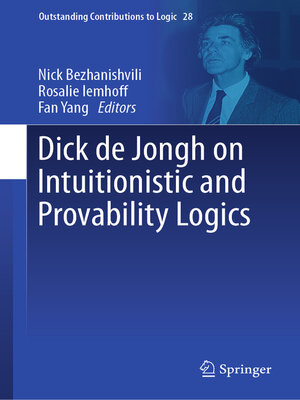Dick de Jongh on Intuitionistic and Provability Logics
ebook ∣ Outstanding Contributions to Logic
By Nick Bezhanishvili

Sign up to save your library
With an OverDrive account, you can save your favorite libraries for at-a-glance information about availability. Find out more about OverDrive accounts.
Find this title in Libby, the library reading app by OverDrive.



Search for a digital library with this title
Title found at these libraries:
| Library Name | Distance |
|---|---|
| Loading... |
This book is dedicated to Dick de Jongh's contributions to the theory of intuitionistic and provability logics. Consisting of 13 chapters, written by leading experts, this book discusses de Jongh's original contributions and consequent developments that have helped to shape these fields.
The book begins with an autobiographic note by Dick de Jongh, which discusses the main themes of his work and places the other contributions in context. The next four chapters explore the De Jongh-Sambin fixed point theorem and other contributions to provability and interpretability logics. The following four chapters focus on modal, intuitionistic and intuitionistic modal logics. They discuss independence of formulas, unification and de Jongh formulas in intuitionistic and modal logics. Then there follow two chapters on the other two areas to which Dick de Jongh made important contributions: the theory of well-partial orders, and formal learning theory. The second to last chapter on Origami Geometry can be seen as representing the Master of Logic program of the Institute for Logic, Language and Computation (ILLC) in which de Jongh invested a lot of energy. The book ends with a complete bibliography of Dick de Jongh in the last chapter. This volume provides a vital overview – and continuation of - de Jongh's prolfic work in the theory of intuitionistic and provability logics.







